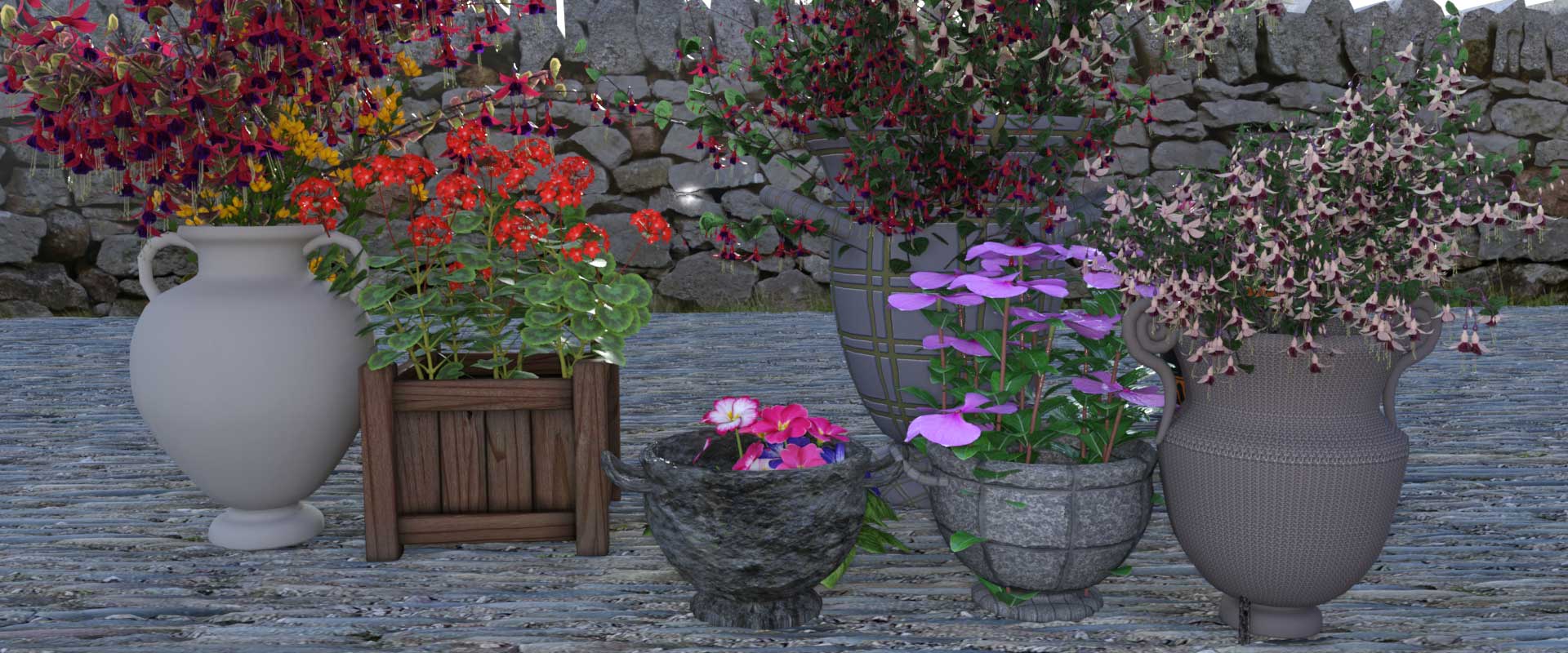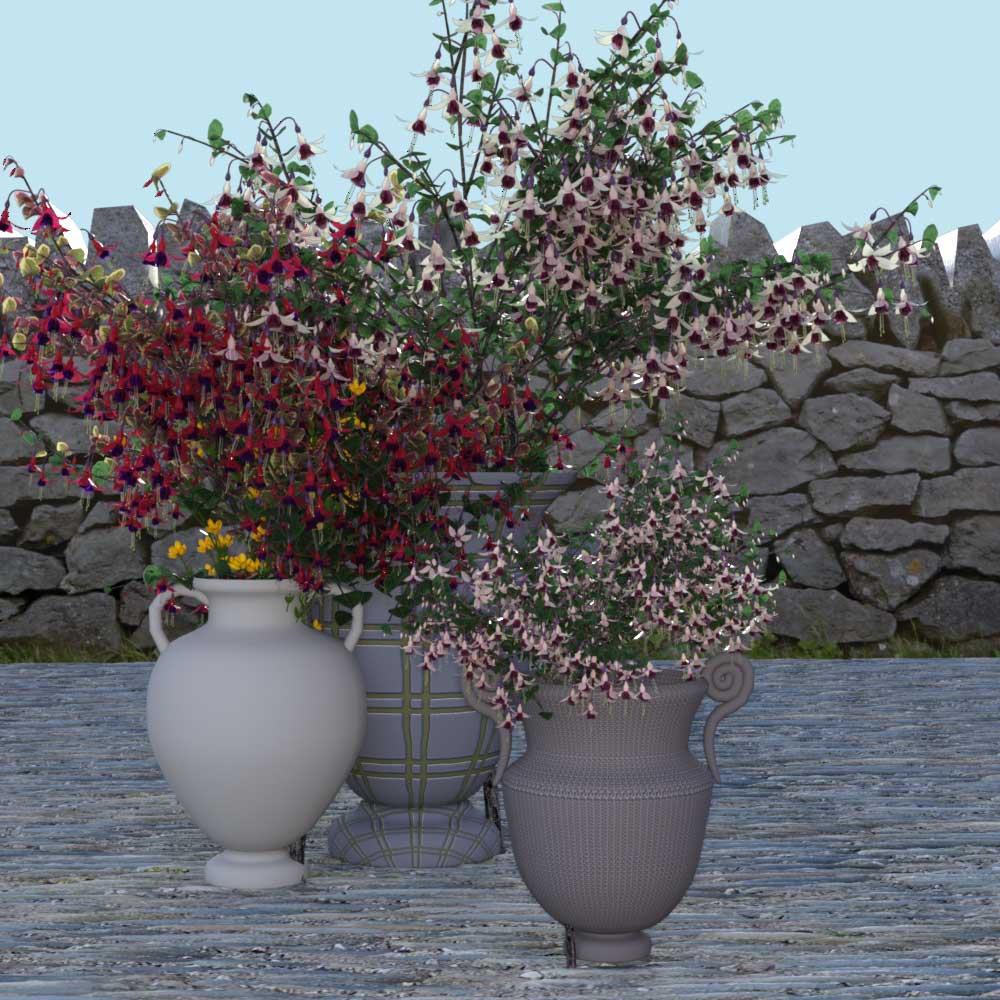

The Fuchsia is a truly international flower. It was first found growing on the Spanish island of Hispaniola (now known as Haiti); it was recorded by a French monk called Charles Plumia around 1697; charitably he did not name it after himself but after a Bavarian botanist called Leonhard Fuchs. The first hybridisation of the Fuchsia was carried out by British gardeners; and then French, American and German gardeners had a go at it as well.
There are now over a hundred different species of fuchsia in the world, ranging in height from a few centimetres right up to about 15 meters tall.
Absolutely. The flowers can make a very attractive garnish and the seeds can be eaten as well. Most of these don't taste terribly good but a lot of work is being done on producing hybrids that are tasty.
No, your cat or dog can eat as many as it wishes without any adverse effects (within reason of course!)
No. You can propagate them easily from cuttings. Theoretically you could buy just one plant and by next summer your garden could be full of colour! There is in fact the occasional local competition held by gardening clubs to see who can produce the most from one single tot.
If you want to be really, really economical buy your first plant at the start of the season and it should cost you a lot less than a pound. You then need a very sharp knife; a 'Stanley' or similar craft knife is ideal; and then cut off all the healthy shoots. Nip off any flower buds.
These cuttings should be about 3 inches long but if you have more time to spare you can use smaller ones provided that they hold a pair of leaves each, trimming them off just below the leaves. You could even go further by slicing your cutting vertically, leaving two cuttings each with a single leaf. These will of course be slower to grow.
Hormone powder is not necessary; simply put the cuttings into pots of fresh compost, water them from below and set them aside to drain. Cover each pot with a polythene bag.
Leave them in a sheltered spot out of direct sun for perhaps three or four weeks and then you can separate each root into it's own individual pot.
Once your baby plants are strong enough you can move them into a sunnier spot. They can then be left to flower or, if you want to propagate them further, you can crop the tips of the plants. This encourages sideshoots, which can then be used to start the whole process all over again!

Have an enquiry?
Watch out - that attractive offer may be a con!
Most people have been used to getting car insurance bargains (relatively speaking, anyway!) from respected comparison sites such as very cheap car insurance site prudentplus.com (they provide cheap short term car insurance too), gocompare.com and confused.com. However, owing to a data breach at Facebook millions of personal details of people in Britain were freely released to criminals recently, and this contained details such as names, phone numbers, email addresses, Facebook login codes and even dates of birth.
Result? A veritable tsunami of fraud attempts: people ringing you up or texting you claiming to be from your bank, insisting that you move your account; saying that a huge Amazon payment is about to be taken from your account unless you ring them immediately; claiming that a parcel cannot be delivered and asking for your correct address and credit card details. According to your caller display the caller is using a UK phone (especially 0203 numbers) but these are now easily forged.
A new variation is unsolicited offers of cheap car insurance - at prices which sound too good to be true, simply because they are a scam.
How does it work? An email arrives telling you that your car insurance has been cancelled because of non payment so you must visit the site immediately to enter fresh payment details. It is from scammers who again want your name, address, and card details so that they can empty your bank account. Or you receive an offer of an insurance renewal at a very attractive price to begin when your next policy expires; you believe it is genuine because they know your name and phone number. A twist on this is sending it via a Facebook 'friend'; since they have login details of millions of Facebook accounts this is easy to forge.
Often younger people are targeted; their car insurance premiums are usually far higher than the average so they are more likely to fall for a cheap offer from an unscrupulous fraudster. A friend of mine's son was a victim and he was stopped by the police and accused of driving without insurance.
He had bought a 'policy' from scammers but it was forged.
His car was impounded - it cost him a lot of money to get it out, including having to buy expensive impounded car insurance. He went to court to plead to explain the circumstances but he was hound guilty of uninsured driving anyway - although the magistrates seemed sympathetic he was told it was his tough luck, and it was his own responsibility to make sure his insurance was in order!
In the meanwhile he had numerous charges against his credit card which he hadn't authorised. He got the money back eventually but it was a great worry for him.
Stay safe. Never answer unsolicited offers, no matter how genuine they first appear; be extremely careful who you give card details to online; don't let anyone rush you into making a financial commitment, no matter how attractive it seems. Thanks to Facebook's love of storing your personal information the world has become a more dangerous place.

Copyright © Danny Clast Designs 2021